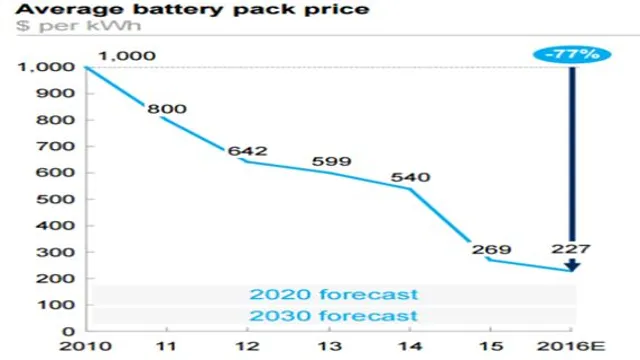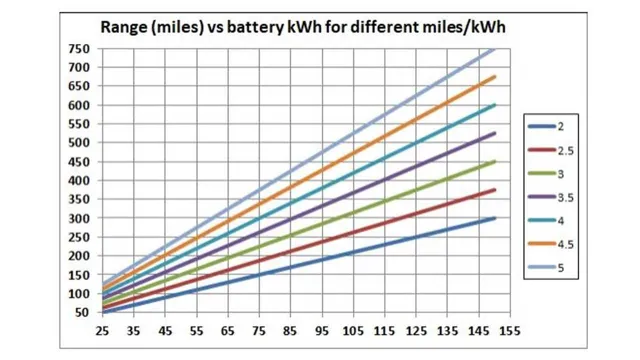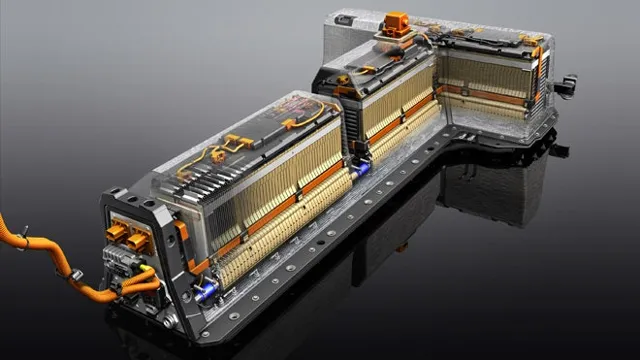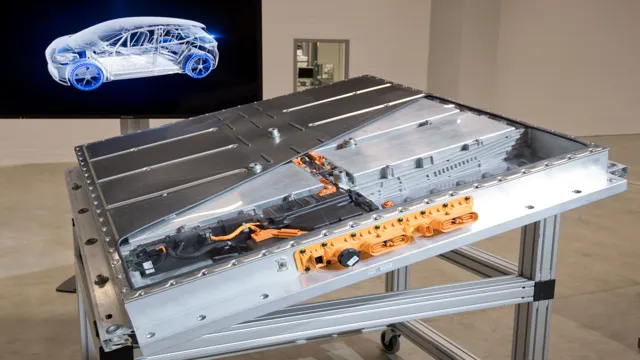The Shocking Truth About the Costs of Electric Car Batteries: Unveiling the Facts
Have you ever wondered why electric cars are often more expensive than their gas-powered counterparts? The answer lies in their battery technology, which is the backbone of the electric car. These batteries are composed of intricate components that are expensive to procure and manufacture. Thus, the cost of electric car batteries has been a major roadblock for their widespread adoption.
However, in recent years, there has been a steady decline in the cost of electric car batteries. This has resulted in a rapid acceleration in the adoption of electric vehicles, driving technological advancements and reducing their cost. In this blog post, we’ll delve deeper into the cost dynamics of electric car batteries and explore the reasons behind their cost decline.
So, fasten your seat belts, and let’s take a ride through the fascinating world of electric car batteries!
Introduction
If you’re considering buying an electric car, one of the most important things to consider is the battery. Electric car batteries are the heart of the vehicle, and they come at a cost. The costs of electric car batteries have been a major concern for car buyers, but they are steadily coming down.
In the early days of electric cars, the cost of the battery accounted for most of the vehicle’s price, but now, the cost of batteries has reduced by more than 80% in the past decade. Despite this, electric car batteries are still the biggest single cost of building an electric car, and it can be difficult to replace them if anything goes wrong because they are so expensive. However, with the increasing interest in electric vehicles and advancements in technology, it’s likely that the costs of electric car batteries will continue to decrease, making electric vehicles even more affordable and accessible for all.
What is the cost of electric car batteries?
The cost of electric car batteries can vary greatly depending on the make and model of the vehicle. However, on average, electric car batteries cost between $5,500 and $7,000 to replace. This high cost can deter some potential buyers from investing in an electric car, but it’s important to consider that the savings in fuel costs and fewer necessary repairs can outweigh the initial investment in the battery.
Additionally, research and development in battery technology are constantly improving, which can lead to reduced costs in the future. Overall, while the cost of electric car batteries may seem daunting at first glance, it’s important to weigh the long-term benefits and potential cost savings.
Why is the cost of electric car batteries important?
The cost of electric car batteries is an important consideration for many individuals looking to switch over to environmentally-friendly modes of transportation. Even though electric vehicles may seem expensive upfront, consumers should keep in mind that battery costs are a significant factor in determining the overall cost of an electric car. This is because battery packs make up a substantial portion of an EV’s total cost.
Additionally, the cost of batteries can affect the resale value of an electric car, just as one would consider the cost of their vehicle’s engine when selling a traditional gas-powered car. However, there is some good news! The cost of electric car batteries has been decreasing over the years, with many automakers investing in research to bring this technology to a wider audience. In fact, prominent industry leaders, such as Elon Musk, have stated their goal to reach a $100 per kWh cost threshold, which could make EVs more affordable and accessible to a broader range of individuals.
How is the cost of electric car batteries calculated?
Electric car batteries play an essential role in powering electric vehicles and have been a significant focus for researchers and manufacturers in recent years. But how much do these batteries cost, and how is the price calculated? Various factors can influence the cost of an electric car battery, including the type of battery technology, the energy density, and the production volume. The cost of electric car batteries is mainly determined by the cost per kilowatt-hour (kWh) of storage capacity, which has been declining steadily over the years.
Generally, the larger the battery capacity, the higher the cost. However, as more affordable and efficient battery technologies evolve, the cost of electric car batteries is expected to continue decreasing, making electric cars more accessible and affordable for consumers.
Factors that Impact the Cost of Electric Car Batteries
When it comes to purchasing an electric car, one of the biggest factors to consider is the cost of the battery. The price of an electric car battery depends on several factors, such as the size of the battery, the type of cells used, and the manufacturing process. Typically, the larger the battery, the more expensive it will be.
Additionally, batteries made with higher-density cells tend to be more expensive, but they also offer better performance and longer lifespans. The manufacturing process also plays a role in the cost, with batteries made using more advanced and complex methods costing more than simpler ones. Another key factor that impacts the cost of electric car batteries is the level of demand.
As more people switch to electric cars, the cost of batteries is likely to decrease as economies of scale are achieved. Overall, while the cost of electric car batteries can be significant, it is important to consider the long-term benefits and savings of owning an electric car.
Raw Materials and Production Costs
Electric car batteries are becoming increasingly popular as the world moves towards greener energy solutions. However, the production costs of these batteries can be quite expensive due to the raw materials used in their construction. One major factor that impacts the cost of electric car batteries is the availability and cost of materials such as lithium and cobalt.
These materials are essential in the production of the battery cells, making up a significant portion of the overall cost. Additionally, production costs such as labor and energy consumption also contribute to the high cost of electric car batteries. However, as technology advances and new, more efficient production methods are developed, these costs are expected to decrease, making electric cars more accessible to the general public.
In the meantime, manufacturers are working hard to minimize these costs in order to make electric cars more affordable for consumers.
Supply and Demand Dynamics
The cost of electric car batteries is determined by a variety of factors, including supply and demand dynamics. Battery production is currently limited by the availability of raw materials such as lithium, nickel, and cobalt. As demand for electric vehicles increases, the supply of these materials is likely to tighten, which could lead to price increases for batteries.
Additionally, improvements in battery technology could impact the cost of production. As batteries become more efficient and require less raw materials, the cost of production may decrease over time. Other factors that could impact the cost of electric car batteries include government incentives, investment in battery production infrastructure, and changes in global economies.
Overall, the cost of electric car batteries is likely to be influenced by a complex mixture of supply and demand factors, technology advancements, and policy decisions.
Technological Advancements
Electric car batteries are becoming increasingly popular due to the environmental and economic benefits they offer. However, the cost of these batteries can vary greatly depending on several factors. One of the main factors that impact the cost of electric car batteries is the technology used to produce them.
As newer and more advanced battery technologies are developed, the cost of producing them decreases, making them more affordable for consumers. Additionally, the scale of production plays a major role in determining the cost of electric car batteries. The higher the production volume, the lower the cost per unit becomes.
Furthermore, the availability of raw materials used to manufacture these batteries can greatly impact their cost. For example, if the supply of lithium, a key component in electric car batteries, becomes limited, the price of the batteries goes up. Overall, the cost of electric car batteries is influenced by a variety of technological, economic, and environmental factors that will continue to evolve as the industry grows.
Government Incentives and Regulations
When it comes to electric car batteries, there are a variety of factors that can impact their cost. One of the biggest is government incentives and regulations. Many governments around the world offer incentives for purchasing electric vehicles, such as tax credits, rebates, and discounted charging rates.
These incentives can help offset the higher cost of electric car batteries and make them more affordable for consumers. On the flip side, governments can also impose regulations that add to the cost of electric car batteries. For example, some countries require that electric car batteries be manufactured using materials that are ethically sourced and do not contribute to environmental and human rights violations.
While these regulations are important, they can add to the cost of electric car batteries and make them more expensive for consumers. Overall, government incentives and regulations can have a significant impact on the cost of electric car batteries, and it’s important to keep an eye on these factors when considering purchasing an electric vehicle.
Current and Future Cost Projections
The costs of electric car batteries have been a point of concern for many potential buyers, but the good news is that the prices are rapidly decreasing. In the last decade, the cost of battery packs has dropped by around 80%, making electric vehicles more affordable than ever before. The prices are projected to continue declining due to advancements in technology and increased demand for EVs.
An analysis conducted by Bloomberg NEF forecasts that by 2023, the cost of EV batteries will drop to around $100/kWh, which is a threshold that many experts believe will make EVs more marketable than their gasoline counterparts. As the prices continue to drop, it’s possible that EVs could eventually become the more budget-friendly option for consumers. While there may still be an initial investment required, the long-term savings on fuel and maintenance costs make it a more financially sensible choice over time.
Ultimately, it’s an exciting time for the EV market, and as technology continues to improve, the costs will only continue to go down for electric car batteries.
Historical Trends in Battery Costs
When it comes to battery technology, the trend over the years has been towards decreasing costs. This can be attributed to various factors, such as advances in technology, economies of scale, and increased competition in the market. According to recent projections, the trend is expected to continue, with lithium-ion battery prices predicted to drop by up to 50% by the end of 2030.
This is great news for industries such as electric vehicles and renewable energy, which rely heavily on battery technology. As costs decrease, we can expect to see more widespread adoption of these technologies, leading to a greener and more sustainable future for all.
Current Cost of Electric Car Batteries
Electric car batteries have come a long way in terms of their cost and efficiency. In the early days of electric cars, the cost of batteries was one of the biggest barriers to widespread adoption. However, in recent times, the cost of electric car batteries has decreased significantly, making electric vehicles more affordable and accessible to the general public.
According to industry experts, the current cost of an electric car battery pack is around $137 per kilowatt-hour (kWh) on average. This is a massive drop from the cost of around $1,000 per kWh a decade ago. Moving forward, experts predict that the cost of electric car batteries will continue to decrease as battery technology improves and more automakers invest in electric vehicles.
It’s projected that by 2023, the average cost of a battery pack will be around $100 per kWh, making electric cars even more affordable for consumers. As the price of electric car batteries decreases, the overall cost of owning and maintaining an electric vehicle will also go down, making them more cost-effective than their gas-powered counterparts.
Future Cost Projections and Forecasts
When it comes to forecasting future costs, there are a multitude of factors that can influence the outcome. Some of these factors include inflation rates, changes in market demand, and fluctuations in the supply chain. It is important to note that while projections can give businesses an idea of what to expect in the future, they are not always entirely accurate.
In order to create the most accurate projections, it is important to take a comprehensive approach and consider all of the potential variables at play. With this approach, businesses can plan for future growth and make informed decisions about pricing, supply chain management, and more. By remaining vigilant and adaptable, businesses can weather changes in market conditions and keep their operations running smoothly.
Conclusion
In the end, the costs of electric car batteries can be shocking, but like any new technology, prices are bound to come down. As the demand for sustainable transportation grows, the future for electric vehicles looks brighter than ever before. So go ahead and hop on the renewable energy bandwagon – your wallet and our planet will thank you!”
The Future of Battery Costs and Electric Cars
Battery costs have been steadily decreasing over the years, making electric vehicles (EVs) more affordable for consumers. However, there are still concerns regarding the future of battery costs and how they will impact the widespread adoption of EVs. According to a report by BloombergNEF, the cost of EV batteries has fallen by 89% since 2010 and is expected to continue to decline in the coming years.
By 2023, EV batteries are projected to cost less than $100 per kilowatt-hour, which is considered the tipping point for mass-market adoption. Furthermore, advancements in battery technology and manufacturing processes are expected to contribute to even lower costs in the future. Overall, the future is looking bright for electric vehicles as battery costs decrease and becoming more competitive with traditional gasoline-powered cars.
FAQs
What is the current cost of electric car batteries?
The cost of electric car batteries varies depending on the size and type of the battery, but on average, it can range from $5,000 to $15,000.
How long do electric car batteries usually last?
The lifespan of an electric car battery depends on various factors, including usage, charging habits and environmental conditions. Typically, electric car batteries last around 8 to 10 years or between 100,000 to 200,000 miles.
Can electric car batteries be recycled?
Yes, electric car batteries are recyclable, and most of the materials used in them, such as lithium-ion and cobalt, can be reused. Recycling batteries also reduces the environmental impact of manufacturing new batteries.
Are there any incentives for purchasing electric car batteries?
Yes, some states and countries offer incentives for purchasing electric car batteries, such as tax credits, rebates, reduced registration fees, and free charging station access. These incentives vary by region and type of electric vehicle.







